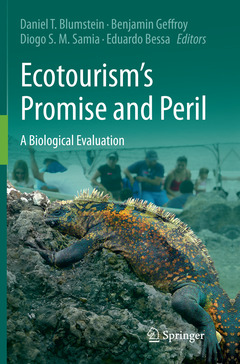Description
Ecotourism’s Promise and Peril, 1st ed. 2017
A Biological Evaluation
Language: English
Subjects for Ecotourism’s Promise and Peril:
Publication date: 05-2018
Support: Print on demand
Publication date: 10-2017
Support: Print on demand
Description
/li>Contents
/li>Biography
/li>Comment
/li>
Intended as a guide for wildlife managers and ecotourism operators, as well as interested ecotourists, this book addresses the biological principles governing how ecotourism affects wildlife. The introductory chapters focus on four key responses to human visitation?behavioral, physiological, ecological, and evolutionary. Readers will discover ecotourism?s effects on biodiversity in connection with various industries that are habitat or taxonomically specific: fish tourism (including both freshwater and marine), marine mammal tourism, the huge industry centered on terrestrial animals, and the well-studied industry of penguin tourism.
Given that the costs and benefits of ecotourism cannot be meaningfully assessed without understanding the human context, particular attention is given to how ecotourism has been used as part of community development. In closing, the book synthesizes the current state of knowledge regarding best practices for reducing human impacts on wildlife. The final chapter highlights key research questions that must be addressed to provide more evidence-based guidelines and policy.
Diogo S. M. Samia holds a Ph.D. in Ecology and Evolution and is currently a postdoctoral researcher at the University of São Paulo, Brazil, where he is investigating the evolutionary mechanisms promoting sexual dimorphism in animals. Much of his work has examined antipredator behavior and he has focused on applying knowledge of animal behavior to wildlife conservation.
Eduardo Bessa is a Zoology Professor and an advisor in the University of Brasília’s Graduate Program in Ecology. His research chiefly focuses on two main areas: understanding reproductive behavior in a range of animal models, especially fish; and applying basic behavioral knowledge to conservation and ecotourism.
These books may interest you

The Birds of Rajasthan 34.35 €



